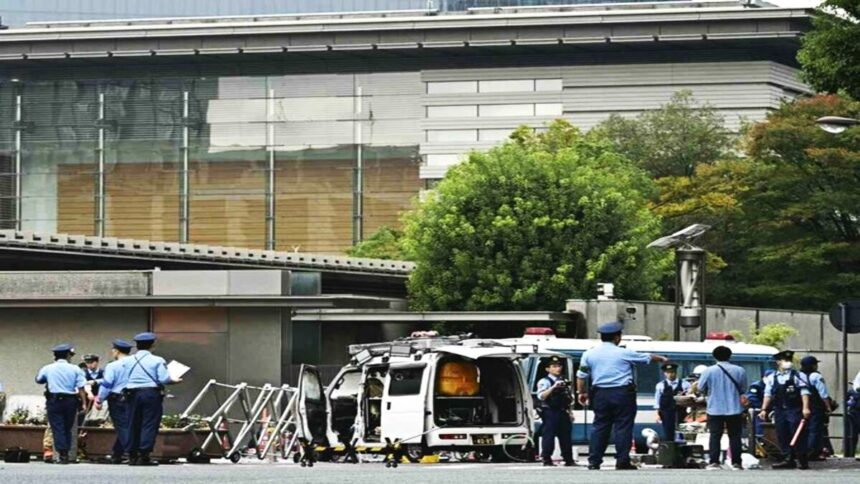On a tense Saturday morning, the headquarters of Japan’s ruling Liberal Democratic Party (LDP) in Tokyo was rocked by an alarming attack. A man identified as Atsunobu Usuda, 49, allegedly threw multiple incendiary devices, resembling Molotov cocktails, into the building. Following this, he crashed his vehicle into the security fencing outside the prime minister’s office, creating a chaotic scene that led to his immediate arrest by Tokyo police.
The Incident Unfolds
According to police reports, Usuda was taken into custody after throwing the firebombs and attempting to direct a smoke bomb toward officers present at the scene. Fortunately, there were no reported injuries during this violent episode. Prime Minister Shigeru Ishiba, who had only recently assumed office, was away on a trip in southern Japan at the time of the attack.
The police charged Usuda with obstructing official duties, but they indicated that additional charges could be forthcoming as the investigation unfolds. Several incendiary devices, along with plastic containers believed to contain kerosene, were discovered inside his vehicle, suggesting a premeditated plan.
Possible Motives Behind the Attack
While the motive for Usuda’s actions remains unclear, reports from Japanese media suggest that he may have been expressing frustrations tied to political ambitions. His social media activity allegedly included complaints about the significant financial burdens associated with running for office in Japan. Additionally, sources indicated that he had previously participated in protests against nuclear energy, hinting at a potential political motivation behind the attack.
As Japan approaches the general election scheduled for October 27, political tensions are running high. The LDP has faced increasing unpopularity, exacerbated by a growing scandal involving dubious funding and accusations of tax evasion. The political landscape has been further complicated by some candidates losing official party backing and opting to run as independents.
A man in his late 40s was arrested after throwing several crude firebombs at the Tokyo headquarters of the ruling Liberal Democratic Party and ramming his car into the protective barrier in front of the prime minister's office.#Tokyo #WritingCommunityhttps://t.co/edg3nkWwDB pic.twitter.com/wFZi30rfRr
— Japan Explorations⛩️🗼🎌 (@super_tourism) October 19, 2024A History of Violence Against Politicians
This incident is part of a disturbing trend of violence targeting politicians in Japan, a country known for its low crime rates. The assassination of former Prime Minister Shinzo Abe in 2022 shocked the nation, as he had held the office longer than anyone else in Japan’s history. Just a year later, an attempt on then-Prime Minister Fumio Kishida’s life occurred when a man threw a pipe bomb at him during a speech, though Kishida emerged unscathed.
The rising frequency of these violent acts raises significant concerns about political safety in Japan, a nation that has long prided itself on stability and public order.
The Political Climate: Uncertainty and Unrest
The backdrop of this attack is a politically charged atmosphere. Prime Minister Shigeru Ishiba recently took over leadership of the LDP amid widespread dissatisfaction. A recent poll revealed a dismal approval rating of just 28 percent for Ishiba, marking the lowest starting approval for any Japanese prime minister since 2000. His government is grappling with a legacy of scandals from the previous administration, which culminated in Kishida’s resignation after three tumultuous years.
Ishiba’s policies have also drawn scrutiny, particularly his vague proposals regarding defense and international relations. His suggestion to create an “Asian NATO” left many political experts confused and seeking clarity. Additionally, his recent decision to dissolve the lower house of Parliament just a day before his confirmation has drawn criticism from opposition parties, with some labeling the move as potentially unconstitutional.
The Upcoming Election
As the October 27 election draws near, all eyes are on how these recent events will impact voter sentiment. The LDP, which has dominated Japanese politics for decades, is facing a challenging electoral landscape amid the splintered opposition. With many voters disillusioned by corruption and internal party strife, the upcoming elections could reshape the political landscape in significant ways.
This attack serves as a stark reminder of the pressures facing political figures in Japan today and the volatility that can arise during contentious times. As the nation prepares to cast its votes, the hope remains that the electoral process can proceed without further violence or upheaval.
Read More : Italy’s New Surrogacy Law: A Controversial Ban on Parenthood Options






